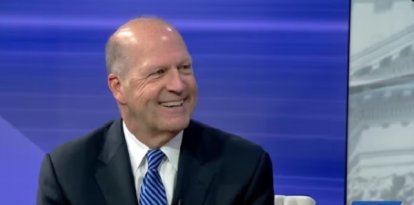Supreme Court rejects Trump's attempt to block ruling in Stormy Daniels case
Justices John Roberts and Amy Coney Barrett joined the three Democratic-appointed justices in rejecting the president-elect's request.

President-elect Donald Trump
The U.S. Supreme Court rejected President-elect Donald Trump's request to block the criminal judgment against him related to the Stormy Daniels case. The ruling paves the way for an unprecedented court proceeding to take place this Friday in New York.
Split vote within the court
The court's vote was not unanimous. Chief Justice John Roberts and Justice Amy Coney Barrett, both Republican appointees, joined the three Democratic justices in rejecting Trump's request. In contrast, the remaining Republican justices, Clarence Thomas, Samuel Alito, Neil Gorsuch and Brett Kavanaugh, expressed their disagreement with the decision, marking a clear ideological divide within the court.
The case and the ruling in New York
In May 2023, Trump was convicted of 34 counts of falsifying business records in an attempt, according to prosecutors, to suppress damaging information before the 2016 election. This conviction resulted in a judicial process that will continue following the Supreme Court's decision to allow it to move forward. This case has been one of the most relevant, not only for the legal implications but for its potential impact on the presidential transition.
Legal arguments by Trump and his lawyers
Trump's lawyers had asked the New York Supreme Court to intervene in the case, claiming that both Judge Juan Merchan and the intermediate appeals court had erred in allowing the sentencing to proceed. In their appeal, they argued that the U.S. Constitution requires criminal sentences to stop automatically while appeals are resolved. They further argued that a felony conviction would have serious consequences for Trump, such as restrictions on his freedom, limitations on his travel and other parole requirements, which would directly interfere with the presidential transition and his ability to take office as the nation's president.
Judge Juan Merchan had noted that a prison sentence was unlikely due to Trump's inauguration as president-elect. Instead, a non-punitive sentence seemed most likely. However, Trump's lawyers argue that even this type of sentencing could affect the presidential transition and damage his authority.
The political context and additional challenges
This court ruling comes at a key moment, as Trump prepares to assume the presidency in January 2025, following his victory in the 2024 election. However, the ruling and other legal challenges still represent potential hurdles. In addition, Trump faces the release of reports by special prosecutor Jack Smith on election meddling and the handling of classified documents at Mar-a-Lago, which could have significant repercussions for his new term.

























